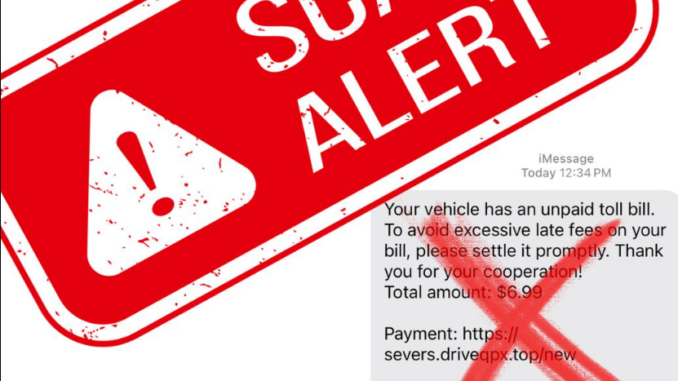
Governor Kathy Hochul is warning New York consumers of E-ZPass text message scams. Consumers have reported receiving SMS text messages attempting to collect tolls. These fake texts are often sent from an international number and request the consumer to reply with “Y” to receive a link and contain an unofficial website. Consumers should be aware that E-ZPass or Tolls by Mail will never send a text or email requesting sensitive personal information such as credit card, birthday, Social Security number or other personally identifiable information.
“Public safety is my top priority, which is why I’m urging New Yorkers to take caution against senseless scammers sending fake E-ZPass text messages in an attempt to collect money for fake, unpaid tolls,” Hochul said. “Consumers should know that E-ZPass, or Tolls by Mail, will never send a text or email requesting personal, sensitive information.”
Anyone who is unsure about a message they received may call E-ZPass directly at 1-800-333-8655 or Tolls by Mail at 1-844-826-8400. or visit EZPassNY.com and TollsByMailNY.com.
Fraudulent or suspicious SMS text messages of any kind can be reported to the New York Department of State’s Division of Consumer Protection Consumer Assistance Helpline at 1-800-697-1220, Monday to Friday from 8:30 a.m. to 4:30 pm (excluding state holidays). Consumer fraud complaints may also be filed at any time with the Federal Trade Commission at reportfraud.ftc.gov.
Here are some tips to follow if anyone receives a fraudulent SMS text message:
- Don’t reply to text messages from unknown numbers. It could lead to a scam. Be wary of unsolicited messages from unknown senders that request personal information or payments and don’t respond to the message.
- Don’t click on any links in the message or attempt to access a website through the text.
- Delete and report the message using your phone’s “report junk” option. Forward unwanted texts to 7726 (SPAM) and unwanted emails to your email provider. Use the reporting features that are built into devices or email platforms. Reporting suspicious phishing messages is one of the most efficient methods for protecting you as it helps identify new or trending phishing attacks.
- Block the sender’s email address or phone number.
- Remember, it’s always better to be cautious. If you’re unsure of the legitimacy of a message, avoid engaging with the sender.
Clicking a link from a fraudulent text message puts your personal information and money at risk. Scammers may be able to:
- Install ransomware or other programs in your device that can spy on your online activity or hold your device hostage by encrypting your data and demanding payment to unscramble it.
- Gain access to your personal or sensitive information — including passwords, credit card numbers, banking PINs, etc. This information can be used to take out loans or credit cards in your name or perform other fraudulent financial transactions.
“Scammers are getting smarter, and by using new technologies and tactics their messages may look legitimate,” Secretary of State Walter T. Mosley said. “It’s important for consumers to know the warning signs that a message may be a scam attempt and what actions to take if they do receive a fraudulent message. I encourage all New Yorkers to follow our tips from the Division of Consumer Protection and remain extra cautious when receiving any message from an unknown sender.”
Thruway Authority Executive Director Frank G. Hoare said, “Our focus is on protecting our customers from scams like these and ensuring that they use the correct payment methods. As these types of scams become more frequent, we strongly encourage everyone to stay vigilant and informed to minimize risks and protect personal information. When in doubt, contact E-ZPass or Tolls By Mail via the official channels listed here before clicking any link sent via text message.”

